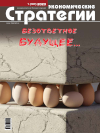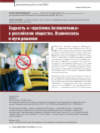Poverty and the “Free Rider Problem” in Russian Society. Interrelationship and Solutions
DOI: 10.33917/es-1.187.2023.36-38
Two shortcomings of our economy — poverty and the “free rider problem” — have the same origin — an exorbitant tax burden on wages. Mathematical modeling of the transition process from modern to transactional taxation, carried out by a group of Russian scientists, has shown that due to this transition, the country’s economy will begin to grow at a rate of 6–7% per year. And most importantly, the very concept of misery will disappear in the country and poverty will be reduced significantly.
References:
1. Eksperty predlozhili reshenie “problemy bezbiletnika” [Experts have Proposed a Solution to the “Free Rider Problem”]. RBK, 2022, 9 dekabrya, available at:
https://www.rbc.ru/economics/09/12/2022/63919fe19a79478d83afaf82.
2. Neravenstvo i bednost’ [Inequality and Poverty]. Federal’naya sluzhba gosudarstvennoi statistiki, available at: https://rosstat.gov.ru/folder/13723.
3. Sotsial’no-ekonomicheskii byulleten’. 2021 [Socio-economic Bulletin. 2021]. Pod red. A.V. Shcherbakova; Tsentr sotsial’no-ekonomicheskogo prognozirovaniya
im. D.I. Mendeleeva, Sretenskii klub im. S.P. Kurdyumova. Moscow, Grifon, 2022.
4. Shcherbakov A.V., Rumyantsev V.Yu., Oleskin A.V. Setevaya ekonomika [Network Economy]. Pod red. A.V. Shcherbakova; Tsentr sotsial’no-ekonomicheskogo
prognozirovaniya im. D.I. Mendeleeva, Sretenskii klub im. S.P. Kurdyumova. Moscow, Grifon, 2020.
5. Shcherbakov A.V., Malkov S.Yu. Mobilizatsionnaya ekonomika Rossii [Mobilization Economy of Russia]. Moscow, Grifon, 2022.
6. Smit A. Issledovanie o prirode i prichinakh bogatstva narodov [Survey on the Nature and Causes of the Wealth of Nations]. Kn. 1–3. Moscow, Azbuka, 2019.



